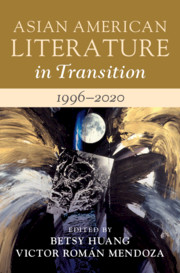Book contents
- Asian American Literature in Transition, 1996–2020
- Asian American Literature in Transition
- Asian American Literature in Transition, 1996–2020
- Copyright page
- Contents
- Illustrations
- Contributors
- Series Preface
- Acknowledgements
- Introduction
- Part I Neoimperialisms, Neoliberalisms, Necropolitics
- Part II Intersections, Intimacies
- Chapter 5 Between the Heteronormative Model Minority and the Homonormative LGBTQ Subject
- Chapter 6 Intimacies and Animacies
- Chapter 7 Trans Feminism, Asian America’s Queer Exception?
- Chapter 8 No Home Away from Home
- Part III Genres, Modalities
- Part IV Movements, Speculations
- Bibliography
- Index
Chapter 7 - Trans Feminism, Asian America’s Queer Exception?
from Part II - Intersections, Intimacies
Published online by Cambridge University Press: 27 May 2021
- Asian American Literature in Transition, 1996–2020
- Asian American Literature in Transition
- Asian American Literature in Transition, 1996–2020
- Copyright page
- Contents
- Illustrations
- Contributors
- Series Preface
- Acknowledgements
- Introduction
- Part I Neoimperialisms, Neoliberalisms, Necropolitics
- Part II Intersections, Intimacies
- Chapter 5 Between the Heteronormative Model Minority and the Homonormative LGBTQ Subject
- Chapter 6 Intimacies and Animacies
- Chapter 7 Trans Feminism, Asian America’s Queer Exception?
- Chapter 8 No Home Away from Home
- Part III Genres, Modalities
- Part IV Movements, Speculations
- Bibliography
- Index
Summary
An Asian American trans imaginary unfolds in the writing of Ryka Aoki, Kim Fu, Vivek Shraya, and others who are redefining the trans literary canon’s primary relationship to the life-writing genre and the twentieth-century memoirs by white authors that are among its foundational texts. This literary unfolding is aided by cisgender or non-trans authors, such as Fu, who use cross-gender narratives as vehicles for exploring the intersection of racialization and gendering, or pursuing new approaches to the impasses of our sexual politics. That the racist gaze can confer gender or even misgender people of color is the basis of David L. Eng’s theory of racial castration, according to which Asian Americans are rendered “queer as such.” At a time when differences between “queer” and “trans” are increasingly being elaborated while trans murder rates keep rising, the emergence of Asian American trans literature therefore begs an important question about this intellectual genealogy: Can an Asian Americanist critique that is “queer as such” also be called trans feminist? Drawing on feminist psychoanalytical criticism, this chapter reads Asian American, Hawaiian, and Asian Canadian trans narratives that subvert the disciplining force of gender misrecognition to produce a queer, trans feminist analysis of anti-Asian racism.
- Type
- Chapter
- Information
- Asian American Literature in Transition, 1996–2020 , pp. 133 - 149Publisher: Cambridge University PressPrint publication year: 2021



